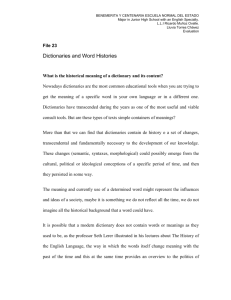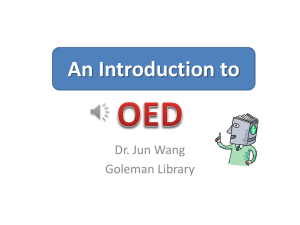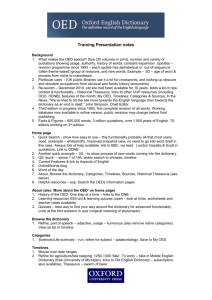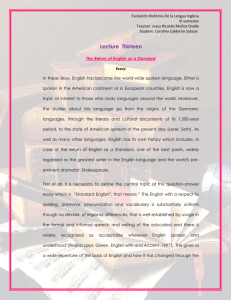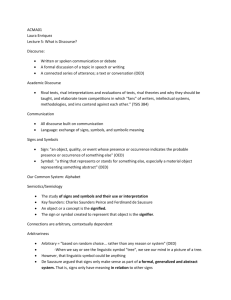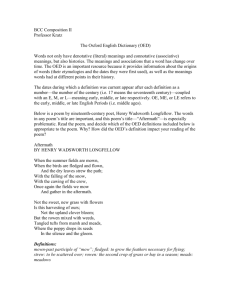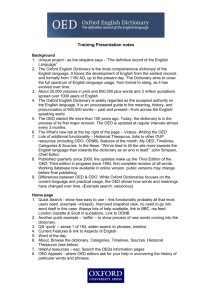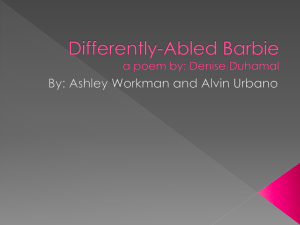values, words, and modernity
advertisement
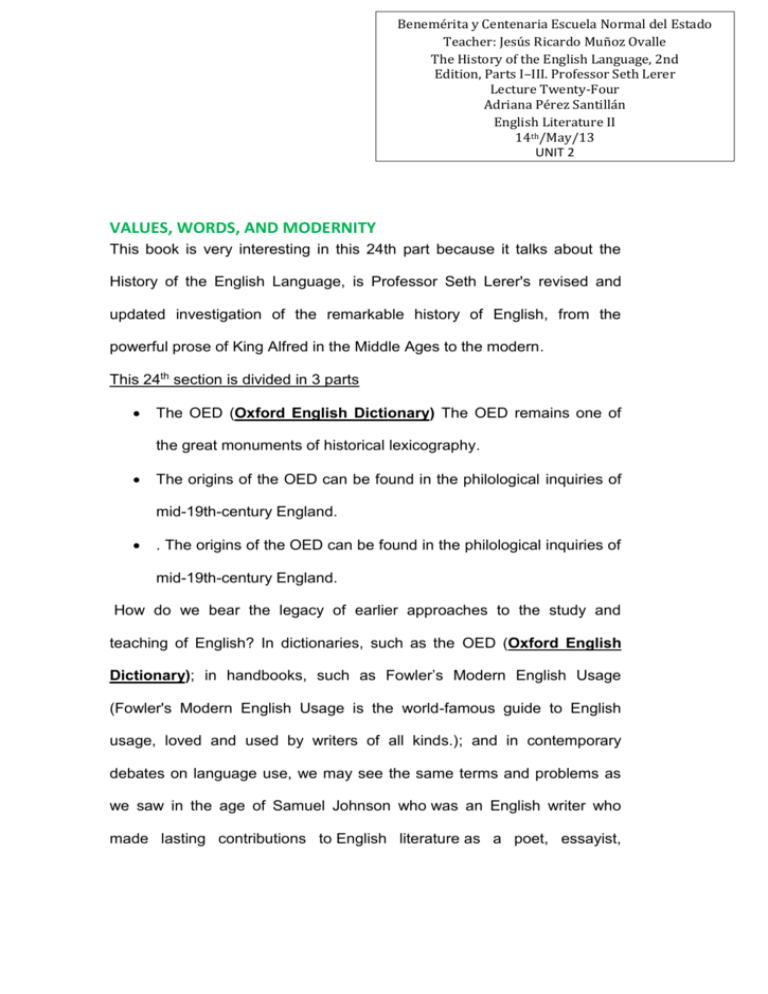
Benemérita y Centenaria Escuela Normal del Estado Teacher: Jesús Ricardo Muñoz Ovalle The History of the English Language, 2nd Edition, Parts I–III. Professor Seth Lerer Lecture Twenty-Four Adriana Pérez Santillán English Literature II 14th/May/13 UNIT 2 VALUES, WORDS, AND MODERNITY This book is very interesting in this 24th part because it talks about the History of the English Language, is Professor Seth Lerer's revised and updated investigation of the remarkable history of English, from the powerful prose of King Alfred in the Middle Ages to the modern. This 24th section is divided in 3 parts The OED (Oxford English Dictionary) The OED remains one of the great monuments of historical lexicography. The origins of the OED can be found in the philological inquiries of mid-19th-century England. . The origins of the OED can be found in the philological inquiries of mid-19th-century England. How do we bear the legacy of earlier approaches to the study and teaching of English? In dictionaries, such as the OED (Oxford English Dictionary); in handbooks, such as Fowler’s Modern English Usage (Fowler's Modern English Usage is the world-famous guide to English usage, loved and used by writers of all kinds.); and in contemporary debates on language use, we may see the same terms and problems as we saw in the age of Samuel Johnson who was an English writer who made lasting contributions to English literature as a poet, essayist, Benemérita y Centenaria Escuela Normal del Estado Teacher: Jesús Ricardo Muñoz Ovalle The History of the English Language, 2nd Edition, Parts I–III. Professor Seth Lerer Lecture Twenty-Four Adriana Pérez Santillán English Literature II 14th/May/13 UNIT 2 moralist, literary critic, biographer, editor and lexicographer. Johnson was a devout Anglican and committed Tory, and has been described as "arguably the most distinguished man of letters in English history". This lecture illustrates not only how we may place these arguments in historical contexts but also how we may recognize the immense impact of these earlier discussions. I. The OED remains one of the great monuments of historical lexicography, and its own history . Which is the explore of origins of the OED and learn something about its makers. There are some of the legacies of the OED in representative writers of the 20th century on language use and its arbitration. II. The origins of the OED can be found in the philological inquiries of mid-19th-century England. A. In the late 18th and early 19th centuries, inquiries into language shifted from the philosophical and metaphysical to the empirical and the historical. 1. The Philological Society was founded in 1842, in London, to study the history of languages and institutionalize the work in Indo-European 2. Scholars of language were increasingly located in schools and universities. Benemérita y Centenaria Escuela Normal del Estado Teacher: Jesús Ricardo Muñoz Ovalle The History of the English Language, 2nd Edition, Parts I–III. Professor Seth Lerer Lecture Twenty-Four Adriana Pérez Santillán English Literature II 14th/May/13 UNIT 2 B. Historical linguistics was pressed into the service of nationalist ideologies in the 19th century. 1. Competing scholars in the various European and classical languages— English, German, French, Italian, and others 2. A fascinating figure in this debate was Max Müller (1823–1900), the ultimate arbiter of language in mid-19th-century England. 3. Müller’s work raised questions about the power of language to confer identity on human beings and values in society. 4. Much of Müller’s work has come in for criticism by later linguists, 5. What, we might ask, does a word refer to? Does the meaning of a word lie in its representational ability or in its history over time? C. In 1857, the Philological Society proposed to create a new English dictionary to establish English etymology and usage on a firm “scientific” basis. 1. The original editors were Herbert Coleridge and Richard Trench. 2. the lexicographer was no longer Samuel Johnson’s “harmless drudge” but a historian of language and of a people, as well as a kind of overseer in the great factory of language. 3. In the 1870s, when Sir James A. H. Murray was appointed general editor of the OED, he set up the Scriptorium, indeed, a word factory. Benemérita y Centenaria Escuela Normal del Estado Teacher: Jesús Ricardo Muñoz Ovalle The History of the English Language, 2nd Edition, Parts I–III. Professor Seth Lerer Lecture Twenty-Four Adriana Pérez Santillán English Literature II 14th/May/13 UNIT 2 III. The OED provides not only lexicographical models but social and, indeed, moral models, as well. A. Some of the main themes in these statements include the following: 1. The relationship between language and society: 2. The role of authority and education in articulating the relationship between language and society: 3. The relationship between style and grammar: 4. The relationship between description and prescription B. In Henry Fowler’s article on grammar from Modern English Usage, we can hear the key idioms of the debates that we have seen at work from the beginning of this course: 1. Consider Fowler’s aesthetic vocabulary, which includes such phrases as “ease and grace,” “clearly and agreeably,” and the equation of good grammar with “good manners.” 2. Like others before him, he seems to phrase the question of grammaticality as a question of sociability. C. In the introduction to Webster’s New World Dictionary of the American Language (9th ed.), entitled 1. We also hear the organic metaphors of the 18th century and Samuel Johnson: Benemérita y Centenaria Escuela Normal del Estado Teacher: Jesús Ricardo Muñoz Ovalle The History of the English Language, 2nd Edition, Parts I–III. Professor Seth Lerer Lecture Twenty-Four Adriana Pérez Santillán English Literature II 14th/May/13 UNIT 2 2. Fowler, too, discusses the “good work” a dictionary can perform in helping to purge the language of its sins. D. In a 1972 article in the journal The American Scholar, A kind of modern Alexander Gil, Bush goes beyond linguistic prescriptivism to embrace social prescriptivism. E. We close with a famous excerpt from George Orwell’s “Politics and the English Language,” F. Our next set of lectures will look at these discussions in the American trajectory, beginning with colonial expansion and moving on to our present time. As a conclusion is that old English was, is, and will be a n important factor in the English language for that reason is very important to take into account an important questions to be aware about English, What were the major Old English dialects, and where were they spoken? And explain some of the typical characteristics of noun and verb forms in Germanic languages. On the other hand English has been an unusually mutable language, readily accepting new terms and new ways of conveying meaning. Professor Lerer brings this second edition up-to-date by including discussions of the latest changes. Benemérita y Centenaria Escuela Normal del Estado Teacher: Jesús Ricardo Muñoz Ovalle The History of the English Language, 2nd Edition, Parts I–III. Professor Seth Lerer Lecture Twenty-Four Adriana Pérez Santillán English Literature II 14th/May/13 UNIT 2
